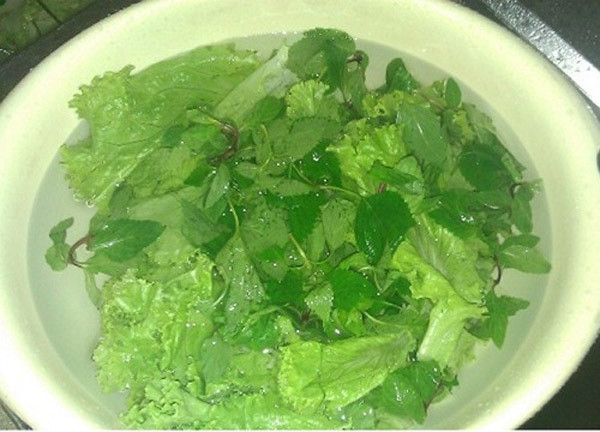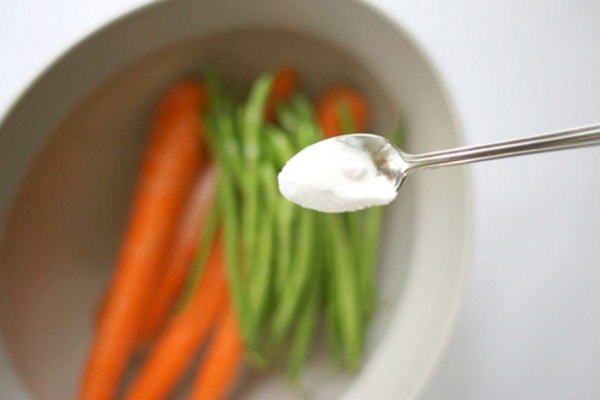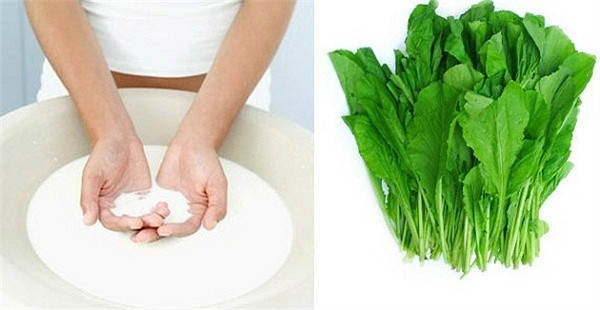4 wrong vegetable washing habits that affect the health of Vietnamese people
Soaking vegetables in salt water, washing vegetables after cutting,... are common mistakes Vietnamese people make that make food unsafe and lose nutritional value.
Many people make mistakes when washing vegetables that are bringing diseases into their homes. Get rid of these habits and wash vegetables, tubers, and fruits properly to eliminate bacteria as well as harmful chemicals such as pesticides.
1. Soaking vegetables in water for too long

This is a mistake that many people make when washing vegetables. This method not only does not work on vegetables that have absorbed chemicals, but also destroys a lot of the nutrients in the vegetables. Moreover, soaking vegetables in water for a long time can cause the preservatives to seep back into the vegetables, causing danger.
According to experts, instead of soaking, you should rinse vegetables under running water until they are completely clean. This is a way to help remove dirt and pesticide residue, limiting the loss of nutrients in vegetables.
2. Cut vegetables first and then wash them.
Nutritionists recommend washing vegetables before cutting. If vegetables are cut and then washed, a certain amount of vitamins that usually exist in water will be lost. After being cut, vegetables will be soaked in water, losing 14-23% of their nutritional value. If soaked overnight, the amount of vitamin C will be almost completely lost. The content of other nutrients such as B vitamins or minerals, water-soluble proteins will also be significantly affected.
3. Soak vegetables in salt water

For a long time, many housewives have had the habit of soaking vegetables and fruits in salt water before processing to remove toxins and ensure food safety. However, many experts warn that this is a wrong way to do it because salt water is almost "ineffective" in removing pesticides and chemicals.
Currently, there is no solution that can completely eliminate pesticides and preservatives on vegetables, tubers and other foods. For some types of pesticides that do not penetrate, meaning they only protect the surface of the vegetables, chemicals can be removed by washing the vegetables under clean running water several times.
As for pesticides that work on pests by systemic absorption (the drug penetrates into fruits and vegetables, and the pests that eat the fruits and vegetables will die), there must be a quarantine period for the drug to decompose completely, and there is no way to wash it off.
4. Vegetables only need to be washed 2-3 times to be clean.
Many people think that vegetables only need to be washed with 2-3 waters to be clean, and when cooked, all bacteria and parasites will die. However, to make vegetables truly "clean", the washing method must be much more elaborate. In fact, if you only wash with 2-3 waters, it is difficult to remove all dirt such as soil, garbage, parasites or microorganisms and chemical compounds such as pesticides, plant protection drugs... that are invisible to the naked eye.
Instructions for washing vegetables and fruits properly to remove pesticides and bacteria:

- After rinsing vegetables under running water, soak them in rice water for a maximum of 15 minutes to neutralize the toxicity of pesticides.
- Cucumbers, eggplants or other vegetables with high levels of pesticides should be washed and peeled before eating.
- Heating at high temperatures also causes pesticides to decompose. Some heat-resistant vegetables such as cauliflower, beans, celery, etc., after washing, blanch in hot water for 2 minutes to reduce the amount of pesticides by 30%. Then cook at high temperatures, thus eliminating 90% of the pesticides.
- Sunlight causes the amount of pesticides on vegetables to break down and decompose. Leaving vegetables in the sunlight for 5 minutes, the amount of residual pesticides on vegetables such as organic mercury and organic chlorine is reduced by about 60%.

